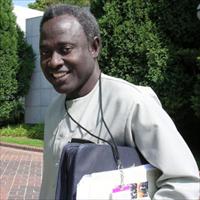Halifa Sallah Highlights Emerging Issues Ahead of LG Elections

Mr Halifa Sallah, the Spokesperson of National Alliance for Democracy and Development (NADD), has reiterated his belief that for society to serve and cater for the needs of the people the way it is supposed to, it is imperative that people take charge of their responsibilities in the administration of society. “If the people are not conscious of the fact that they own society, others will take ownership. The people must understand that the country belongs to them, to become sovereign. And if a country belongs to us, then we should be concerned in the manner in which that country is managed. The Gambian people must accept responsibility for the way Gambia is run and if they fail to take charge of their destiny, they will continue to be the victims of blind destiny, continue to live in poverty and misery up to their graves.” Mr Sallah gave the advice in the build-up to the forthcoming local government elections.
The renowned politician cum sociologist, who has been away from the country for some time now owing to his invitation by the pan-African parliament to be part of a committee to prepare a paper and inform the views of parliament on the issue of an African union government and a United States of Africa, among other engagements, made these remarks in an exclusive interview with The Point.
According to the NADD spokesperson, the significance of elections in general consists in the fact that it affords people the opportunity to assert their authority by indicating their power and consent to the existence of a situation. He however expressed his regret and disappointment that local councils have been rubbed of the autonomy and authority that they require. “This negates the principle of the authority of the people and this is really what is bad about this local government elections because people are actually going to elect people who would be under the control of the executive and will not be able to carry on their duties in an autonomous manner,” he stated.
In Mr Sallah’s opinion, the most potent counteraction to this state of affairs would have been for the opposition parties to adopt a policy of agreeing to sponsor independent candidates throughout the country and persuade people to vote for them so as to show their dissatisfaction with the APRC regime. Thereafter the opposition, he continued, might call for election as well as local government reforms so as to re-institute the original constitutional provisions that sought to make the councils autonomous. “That would have been a lesson to the President and the APRC party that yes he has control over the APRC but he will not be allowed to be in control of every institution in this country,” he maintained, adding that the local government elections in the prevailing circumstances would only serve as a measure for each party to know their relative weight.
Commenting on the recent amendment of the Local Government Act, which gives sweeping powers to the President over area councils, Mr Sallah noted that Gambians would now believe that he has been amply absolved by history. “During the constitutional review process we reviewed the draft constitution and indicated to the Gambian people that the drafting committee and the commission that was set up to review the 1970 constitution had taken into consideration the concerns of Gambians who wanted this country to become more democratic because when you talk about a republic you are actually talking about the sovereignty of the people, the abolition of monarchy,” he concluded.
 Back and Next - Back and Next
Back and Next - Back and Next See Also - See Also
See Also - See Also